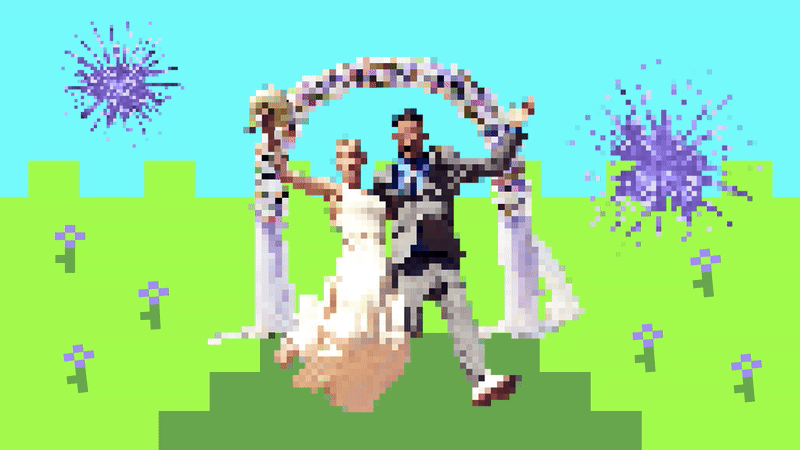On a crisp Saturday in March, beneath a canopy of pixelated cherry blossoms, two avatars stood in front of a digital altar crafted from shimmering quartz blocks and flickering redstone torches. They were surrounded by a sprawling Minecraft village, complete with custom-coded NPCs reciting lore about the couple’s decade-long digital courtship. Nearby, pixelated foxes darted between guests—each one logged in from across the world, dressed in custom skins as forest druids and rogue mages. After the vows (typed and read aloud on Discord), guests dispersed for side quests, scavenger hunts, and an enchanted maze culminating in a virtual fireworks show. This wasn’t a rehearsal for an in-person wedding—this was the wedding.
Welcome to the new frontier of love: the hyper-niche internet wedding.
Over the past decade, virtual weddings emerged as a necessity—Zoom ceremonies during Covid-19 lockdowns, livestreams for distant relatives, even robotic proxies for international couples facing visa issues. But what’s happening now is different. More couples are choosing to host their ceremonies in the very digital spaces where they first met, bonded, and built their lives. Not as a compromise, but as a celebration of who they are—and the communities that shaped them. As such, platforms like Minecraft, Discord, and VRChat have become unconventional yet meaningful venues. These aren’t stopgap solutions; they’re deliberate, deeply personal choices.
These digital ceremonies often incorporate interactive elements: virtual scavenger hunts, themed quests, and personalized avatars. Guests might receive digital invitations embedded with augmented reality features, allowing them to experience a 3D animation of the couple’s journey together. One couple, who met in a Discord server dedicated to indie game development, tells WIRED they hosted their wedding within that same server, complete with custom emoji, bot-generated confetti, and a playlist curated by fellow server members.
The appeal isn’t just about novelty. For many, it’s about authenticity and accessibility. Virtual weddings can be more inclusive, allowing friends and family from around the globe to attend without the constraints of travel. They also offer a canvas for creativity, enabling couples to design experiences that reflect their unique stories and shared interests. It’s not uncommon to hear vows referencing video game lore or to see ring exchanges coded into emotes or Discord bots.
Sarah Nguyen, 24, from Portland, Oregon, and Jamie Patel, 25, from Leicester, England, met when they were 13 years old on a Minecraft role-play server. What started as a random team-up to build a tavern in a medieval village turned into years of collaboration. “We’d log on almost every day after school,” Nguyen tells WIRED. “Sometimes we’d just build or farm; sometimes we’d write whole stories for our characters. It was this creative outlet that became our friendship and then something more.”
By the time they were 18, Nguyen and Patel had developed their own shared Minecraft world—a sprawling, custom-coded fantasy realm where their avatars led an epic saga as rulers of a magical kingdom. “We didn’t just game together,” Patel says. “We were world-building, storytelling, living inside this universe we made.
When Patel proposed last year, it happened, fittingly, in Minecraft. He designed a secret quest line for Nguyen’s character, culminating in a mountaintop scene where an NPC delivered his proposal via in-game dialog. “He knew I’d say yes before I even reached the end,” Nguyen says, laughing.
So when it came time to plan their wedding, Minecraft wasn’t just a nostalgic choice—it was inevitable. “It’s the closest thing we have to a shared home,” Nguyen explains. “We’ve lived apart our whole relationship. That world is where we live together.” (The couple now lives together in Portland.)
Their virtual wedding included 15 custom NPCs recounting their love story, a cathedral constructed from sea lanterns and obsidian blocks, and a scavenger hunt where guests helped retrieve a “forgotten heirloom” to unlock the altar. Around 50 friends and family attended, logging in from eight countries. “We had some older relatives watch via Twitch since they weren’t gamers,” Patel says.
While some guests were skeptical at first, both families ultimately embraced it. “My parents loved that it was so personal,” Nguyen says. “They didn’t really understand Minecraft, but they understood that this was us.”
The whole event cost around $300, mostly for custom skin commissions, server hosting, and paying a designer to help with scripting the NPCs and quests. “Way cheaper than a real-world venue,” Patel says. “And no seating charts.”
They also held a small in-person dinner a few weeks later for local relatives, but for them, the Minecraft ceremony was “the real wedding.”
In the Roblox metaverse, Ashley Rivera, 27, from San Diego, and Luna Kim, 26, from Seoul, held their wedding inside a pastel castle floating among digital clouds. The couple met five years ago in a Roblox fashion design community, bonding over a shared love of avatar styling, digital art, and hyperpop playlists. “We’d spend hours just designing outfits together,” Kim says. “It wasn’t just about dressing up—it was about creating little versions of ourselves and dreaming up lives for them.”
Though they had never played Roblox competitively, they were deeply embedded in its social and creative subcultures. “We met most of our friends there,” Rivera says. “It’s where we threw birthday parties, hosted art shows, organized karaoke nights. It was our town square.”
When Kim proposed last summer, it happened inside a Roblox “fashion show” they’d built together. “She walked an avatar down the runway holding a giant neon ring,” Rivera says. “And I just started sobbing.”
Their wedding reflected that same playful spirit. Guests arrived as anime-style avatars dressed in themed looks—cottagecore, fairy, or postapocalyptic chic. Instead of a cocktail hour, guests completed an obstacle course Kim designed. Instead of a DJ, they programmed a scripted dance party synced to their favorite hyperpop tracks.
“It was chaotic but perfect,” Kim says. “We wanted it to feel like a game, not a ceremony.”
Their families were supportive, if bemused. “My grandma thought Roblox was a new church,” Rivera says, laughing. “But my little cousins were obsessed.” They also hosted an IRL brunch with family a month later.
The entire virtual event cost them about $500, mainly spent on custom avatar assets and hiring a Roblox developer to script the venue and activities. “We had way more freedom than a real-world venue would allow,” Rivera says. “And no clean-up after.”
Though both couples admitted to some early fears about being judged, they found their communities overwhelmingly supportive. “People think it’s weird until they see how beautiful and personal it actually is,” Rivera says. “We weren’t trying to replace weddings. We were just making one that felt true to us.”
Jessica Hu, 34, an ordained officiant based in Chicago, has made a name for herself as a “digital celebrant,” specializing in ceremonies across Twitch, Discord, and VRChat. Since launching her virtual wedding services in 2020, she has officiated over 40 ceremonies in online spaces.
“It’s easy to dismiss it as novelty,” Hu says. “But these weddings are deeply sacred. I’ve had couples exchange vows using emoji reactions. I’ve had Discord bots cue the processional music. I’ve seen Twitch chats cry in real time.”
For many, Hu says, these ceremonies aren’t just an alternative to real-life weddings—they’re more accessible, more creative, and more authentic. “I’ve worked with queer couples whose families wouldn’t attend a physical wedding, or couples in countries where their identities aren’t recognized. In virtual space, they can be surrounded by love, on their own terms.”
for the wedding industry at large, the interest in custom digital weddings opens up new possibilities. Event planning companies are starting to offer digital packages. For instance, Wedfuly specializes in virtual wedding services, providing equipment and professional support to livestream ceremonies with multi-angle coverage and interactive features. Designers are creating custom skins and virtual fashion. Tech developers are building plug-ins and mods specifically for ceremonies in platforms like Minecraft or VRChat. A cottage industry is emerging around this demand, one that merges code with creativity, UX with intimacy.
There’s also a broader cultural resonance: These weddings speak to a generation raised on fandom, internet-native humor, and platforms where the line between creator and consumer is blurred. They’re not looking for a one-size-fits-all fairy tale—they want a love story they cowrite.
So no, the church bells aren’t going silent anytime soon. But in the background, you might hear something else: the swell of a custom-coded orchestral track, the soft ping of an emoji reaction, or the laughter of guests navigating a post-ceremony quest.




